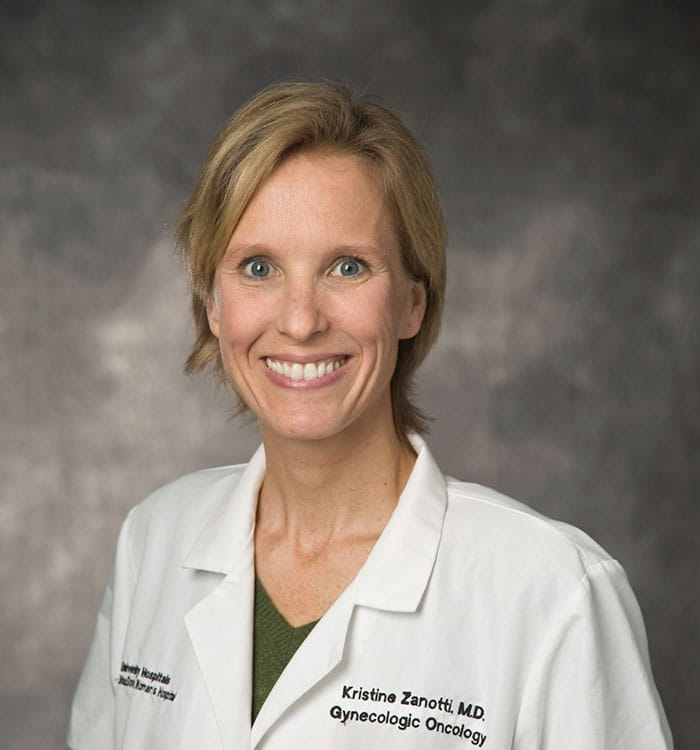New Oncology Recovery and Survivorship Program
March 05, 2020
Advanced practice providers will offer wide range of therapeutic services
Innovations in Obstetrics & Gynecology | Winter 2020
This summer, University Hospitals Seidman Cancer Center will launch a comprehensive cancer recovery and survivorship program for all oncology patients who are completing therapies.
 Kristine Zanotti, MD
Kristine Zanotti, MD“There are so many high-tech — and very effective — things we can do for patients in the realm of oncology,” explains Kristine Zanotti, MD, Director, Gynecologic Oncology Fellowship, University Hospitals Cleveland Medical Center; Director, Cancer Recovery and Survivorship, UH Seidman Cancer Center; and Associate Professor of Gynecologic Oncology, Department of Reproductive Biology, Case Western Reserve University School of Medicine. “However, once treatment is done, we can continue to work with patients to improve their overall health outcomes as related to both their cancer risks as well as their noncancer-related quality of life and health risks.”
WHY IT MATTERS
By 2026, an estimated 20.3 million Americans, most 70 or older, will be cancer survivors. While completing treatment for cancer is certainly a relief for patients and their families, the transition from post-acute care can also be fraught with anxiety, as patients fear cancer recurrence and the loss of the sense of safety that came from regular appointments with their oncologist. Treatment-related side effects can linger long after the conclusion of therapy, and cancer survivors are at higher risk of comorbidities, such as cardiovascular disease, osteoporosis, other malignancies and secondary cancers that add to their cancer-related risks.
Survivorship programs bridge this transition to optimize the health outcomes of cancer patients. They help patients deal with any prolonged challenges following cancer treatment while mitigating other adverse outcomes. At University Hospitals, advanced practice providers will complete training this spring to standardize UH’s approach to assessing and treating patients in the new cancer recovery and survivorship program, which will launch in June.
HOW IT WORKS
At the conclusion of surgery or cancer treatment, patients will be given an appointment with a cancer recovery and survivorship provider. An advanced practice provider will functionally assess patients in the domains of cancer and treatment-related physical and psychosocial problems that can be actively managed. This may include fatigue, balance problems, recurrent anxiety, poor sleep and sexual dysfunction. The program also will actively address health risks going forward by partnering with patients for positive lifestyle changes, which may include interventions such as diet modification, weight loss and smoking cessation.
“Smoking cessation and obesity management are two of the highest-value services we can offer,” Dr. Zanotti says. “If a cancer survivor quits smoking, for example, it dramatically reduces both their cancer and noncancer risks.”
Together, practitioners and patients will set goals to help patients quickly return to baseline functioning or to manage optimally at their new baseline. Much of the program is geared toward patient education with a goal of self-management. Patients who participate in survivorship programs often see much greater improvements in quality of life and functioning than those who do not, says Dr. Zanotti.
She notes that the focus of the cancer recovery and survivorship program is to help patients recover in a more robust way from cancer and its therapies. “All patients, regardless of their risk for recurrence, have a recovery process when they complete cancer therapies,” says Dr. Zanotti. “If we can facilitate this in a medically supervised way, it enhances the pace of progress and improves overall functioning afterwards.”
To maintain continuity, however, oncologists will continue to engage with their patients for cancer surveillance and recurrence detection after treatment.
MULTIDISCIPLINARY APPROACH
The program is multidimensional and multidisciplinary, Dr. Zanotti says. Providers in the program will offer services in a wide range of therapeutic areas, such as diet counseling, psychosocial counseling and social work support. Some advanced practice providers have expertise in specific specialty areas — for example, sexual health or radiation-related toxicity management. Additionally, physical therapists who are specially trained in cancer rehabilitation will provide an important element of patients’ cancer recovery care.
“We’re collaborating with providers across multiple disciplines so patients can take advantage of existing resources at UH and in the community at large,” explains Dr. Zanotti. “Once the program begins, we’ll evaluate program success by measuring patient satisfaction and health-related quality of life outcomes. We also hope to see better healthcare utilization, such as lower rates of hospitalization and fewer trips to the emergency room.
“This is really high-value care,” she adds. “We can do a lot for patients who feel anxiety at the end of treatment or who are unhappy with how they feel at the end of treatment. It’s not all about pain or tangible things. We can help patients with much needed physical and psychosocial adjustments as well.”
Physicians can refer patients into the general cancer recovery and survivorship program or request a specific provider, based on a patient’s needs.
To refer patients into the cancer recovery and survivorship program, or to contact Dr. Zanotti, call 216-553-1537.


